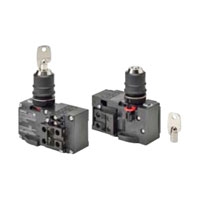Guard Lock Safety Key Selector Switch
A22LK
 The guard lock prevents accidental mode changes.
The guard lock prevents accidental mode changes.
Certified Standards
Certification body | Standards | File No. |
UL | UL508, CSA C22.2 No.14 | E76675 |
TÜV SÜD | EN60947-5-1 (certified direct opening) | Consult your OMRON representative for details. |
CQC(CCC) | GB/T 14048.5 | Consult your OMRON representative for details. |
KOSHA | KS C IEC 60947-5-1 | Consult your OMRON representative for details. |
Note: Only models with NC contacts have a direct opening mechanism.
Certified Standard Ratings
TÜV (EN60947-5-1)
Utilization category | AC-15 | DC-13 |
Rated operating current (Ie) | 3 A | 0.27 A |
Rated operating voltage (Ue) | 240 V | 250 V |
Note: Use a 10 A fuse type gI or gG that conforms to IEC60269 as a short-circuit protection device. This fuse is not built
into the Switch.
into the Switch.
Solenoid Coil Characteristics
Type | 24 VDC |
Rated operating voltage (100% ED) | 24 VDC ±10% |
Current consumption | Approx. 88mA |
Insulation | Class A (130°C max.) |
Characteristics
Model | A22LK | |
Allowable operating frequency | Mechanical | 30 operations/minute max. |
Electrical | 30 operations/minute max. | |
Insulation resistance | 100 MΩ min. (at 500 VDC) | |
Dielectric strength | Between terminals of same polarity | 2,500 VAC, 50/60Hz for 1min. |
Between each terminal and ground | 6,000 VAC, 50/60Hz for 1min. | |
Vibration resistance *1 | 10 to 55 Hz, 1.5mm double amplitude (within 1 ms) | |
Shock resistance | Destruction | 1000m/s2 |
Malfunction *1 | 300m/s2 | |
Durability | Mechanical | 100,000 operations min. |
Electrical | 100,000 operations min. | |
Ambient operating temperature *2 | -10 to +55°C | |
Ambient operating humidity | 35% to 85%RH | |
Degree of protection *3 | IP65 *3 | |
Electric shock protection class | Class II | |
Degree of contamination | 3 (EN60947-5-1) | |
Note: 1. Do not allow the load current to exceed the rated value.
2. The contact ON/OFF timing is not synchronized. Confirm performance before application.
3. Once the contacts have been used to switch a load, however, they cannot be used to switch smaller loads. The contact surfaces will become rough once they have been used and contact reliability for smaller loads may be reduced.
*1. Malfunction within 1 ms.
*2. With no icing or condensation.
*3. The degree of protection from the front of the panel.
2. The contact ON/OFF timing is not synchronized. Confirm performance before application.
3. Once the contacts have been used to switch a load, however, they cannot be used to switch smaller loads. The contact surfaces will become rough once they have been used and contact reliability for smaller loads may be reduced.
*1. Malfunction within 1 ms.
*2. With no icing or condensation.
*3. The degree of protection from the front of the panel.




